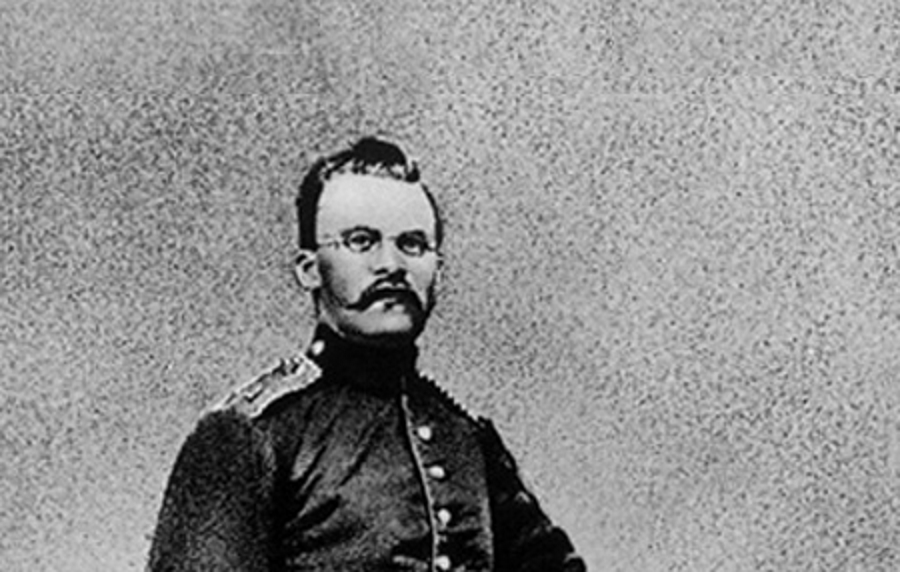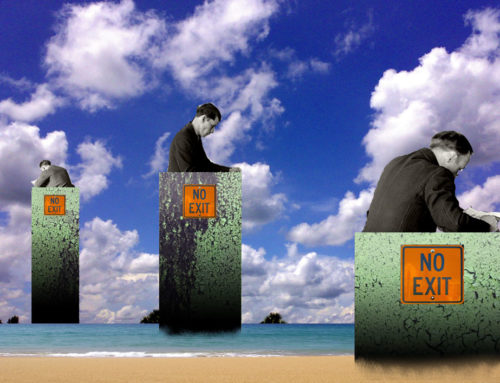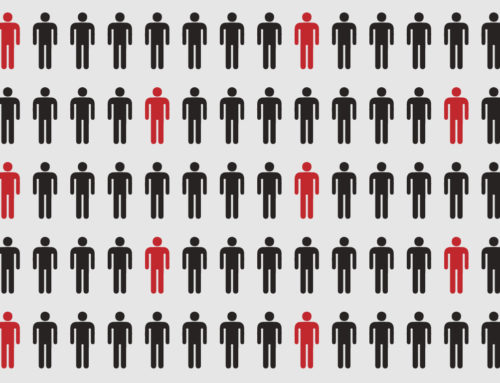By: Ippolit Belinski
An earlier version of this article appeared on Paradox of the Day.
Nietzsche is often portrayed as an aristocratic elitist, whose main concern was with higher morals and who strongly opposed any type of herd mentality. This is generally true, albeit very crudely formulated (and indeed oversimplified). But it does not mean—as is often claimed—that Nietzsche was also an elitist aristocrat in his political views.
It is often claimed that, because Nietzsche was concerned with higher morals, he therefore disavowed any sense of egalitarian community. By this reading, he staunchly opposed democratic principles, or any form of politics which aims towards equality.
I believe this account is highly problematic. A selection of aphorisms of Nietzsche may lead to a variety of positions, often contradictory. In what follows, I will go over passages where Nietzsche criticises democracy and contrast them with passages where Nietzsche seems to be in favour of egalitarian principles. I am not suggesting that Nietzsche was an egalitarian theorist, or even that he held a particular political view in his written work. Indeed, as I discuss in the conclusion to this article, I do not believe there is any political theory per se in Nietzsche. The claim made here is modest: namely, that Nietzsche’s views about democracy are not that simple. If we wish understand the implications of Nietzsche’s views to political theory, we should first address the question whether he indeed proposed a political theory in his body of written work.
Critique of democracy and egalitarianism
I have long written about Nietzsche not being reducible to aphorisms, but as per usual, in defence of these views come aphorisms where Nietzsche criticises democracy. Here are a couple:
We who have a different faith –, we who consider the democratic movement to be not merely an abased form of political organization, but rather an abased (more specifically a diminished) form of humanity, a mediocritization and depreciation of humanity in value: where do we need to reach with our hopes? (BGE 203)
Or for instance this one,
What are the conditions for the decline of German culture? That ‘higher education’ is not a privilege any more – the democratization of ‘Bildung’[1], the fact that it is becoming common and commonplace . . . And do not forget that military privileges practically compel people to pursue too much higher schooling, which leads to its downfall. (TI, What the Germans lack, 5).
What we can see from this kind of passages, if taken in isolation, is that Nietzsche indeed denounced any sense of egalitarian or democratic politics. That his ‘project’ was meant to overcome the malaise with which Germany (and indeed our contemporary culture as well) was infested with.
Additionally, we should also take into account the specificity of Nietzsche’s cultural background – it was a very common practice in 19th century Germany to admire Athens’ culture, and to stand against its principal institution of democracy. The 19th century was in no sense unique in its fear of the masses (some scholars literally referred to the masses as ‘grande peur’). Already in Aristotle, in his Politics, Book III.7, a distinction is to be made between the correct and the deviant forms of constitution, where the rule by the many is characterised as a polity in its correct form, and a democracy in its deviant form.
Some Nietzsche scholars go even further and think of Nietzsche’s anti-democratic stance to be rooted before his philosophical considerations. As Raymond Geuss notes,
Nietzsche’s utter contempt for ‘democracy’ seems to be one of the most basic features of his intellectual and psychological make-up. It certainly antedated the development of any of his characteristic philosophic views. He is said to have resigned from a student fraternity because he disapproved of its excessively democratic admissions policies. It is true that virtually no one in the nineteenth century would have thought of ‘democracy’ in the way that has become customary here in Western Europe at the end of the twentieth century, as self-evidently the only justifiable form of political organization, but even by the standards of his period Nietzsche’s political views were not enlightened. (Raymond Geuss in Introduction to BT)
But this is only so if we fall for the familiar fallacy in reading Nietzsche and focus on a particular aphorism, from which we further derive Nietzsche’s position on a particular theme – in our case, that Nietzsche abhorred democracy. But in doing so, we forget to ask some very important questions. Let us accept, for the moment, that Nietzsche was against democracy in his middle and later period (from 1880 onwards). Should we stop there, or should we ask in what sense he was opposed? What in particular was he opposed to? What type of democracy was he opposed to – Athenian, representative, or participatory democracy?
Defence of democracy and egalitarianism
These type of questions lead to a different look at Nietzsche’s views of democracy, for they suddenly enable the reader to look for passages that no longer condemn democracy or egalitarian politics. And it appears there are many such passages, though they are generally restricted to Nietzsche’s early body of work. Let us take a look, for instance, at Homer’s Contest:
the feeling that the contest is vital, if the well-being of the state is to continue, we should think about the original meaning of ostracism: as, for example, expressed by the Ephesians at the banning of Hermodor. ‘Amongst us, nobody should be the best; but if somebody is, let him be somewhere else, with other people.’ [Heraclitus, fragment 121] For why should nobody be the best? Because with that, the contest would dry up and the permanent basis of life in the Hellenic state would be endangered. Later, ostracism acquires a different relation to the contest: it is used when there is the obvious danger that one of the great contending politicians and party leaders might feel driven, in the heat of battle, to use harmful and destructive means and to conduct dangerous coups d’états.
If we are to think of Nietzsche as an aristocratic elitist, does not this passage at least problematise such a view? Does not elimination of the great from the process (be that a political process or one of gymnastics) not devalue the culture, rather than raising it? Indeed, does this not contradict the very premise of higher morals and herd mentality?
According to Nietzsche himself, at this stage of his writing, they do not do so, and the best illustration of this is perhaps in his first published work, The Birth of Tragedy:
tragedy arose from the tragic chorus and was originally chorus and nothing but chorus. From this we derive the obligation to look into the heart of this tragic chorus as into the true, original drama, rather than simply contenting ourselves with the usual artistic clichés, such as the claim that the chorus is the ideal (idealisch) spectator, or that it represents the people in contrast to the princely region of the stage. This last interpretation sounds so lofty to the ears of some politicians, as if the immutable moral law of the democratic Athenians were represented in the popular chorus which was always proved right, beyond all the passionate excesses and indulgences of the kings. But no matter how strongly a remark by Aristotle seems to suggest this [Problemata 19.48.922b18ff.], this idea had no influence on the original formation of tragedy, since its purely religious origins preclude the entire opposition between prince and people, and indeed any kind of political-social sphere [my emphasis].
Does not this passage show that Nietzsche in this early period, far from being an aristocratic elitist, finds in tragedy something peculiar that could function as the opposite – something through which any sense of elitism is at least temporarily transcended? The peculiarity of the Greek chorus was precisely that it enflamed a communal feeling through which the people and the prince were united into one.
A turn to morality
There is still one possible line of argument that could be presented to support the view that Nietzsche was in favour of aristocracy. The examples used above that oppose egalitarian principles of democracy are from his later period, where he matures, becomes wiser, etc.; while the examples that would be in favour of egalitarian principles are from his early period, when he is still naïve, etc. Should we not consider Nietzsche to look back at his work and consider that, perhaps, he grew out of his youthful naiveté? After all, this is what he says at a later preface to his The Birth of Tragedy, aptly entitled An Attempt at Self-Criticism (written in 1886, and what I take to be true to its title):
And that I should have begun to invent stories about the ‘German character’, on the basis of the latest German music, as if it were about to discover or re-discover itself – and this at a time when the German spirit, which had recently shown the will to rule Europe and the strength to lead Europe, had abdicated, finally and definitively, and, using the pompous pretext of founding an empire, was in a process of transition to mediocrity, democracy, and ‘modern ideas’.
Are we to conclude from this passage, that Nietzsche changed his view of democracy over the course of time? Perhaps, but does that also nullify the questions that this article started with? – Should we stop with an ‘evolution’ of an author’s views, or should we ask: in what sense is Nietzsche opposed to democracy? What in particular in democracy was he opposed to? What type of democracy was he opposed to?
My claim is that an attentive reader of Nietzsche would not be able to find a political answer to any of these questions. Yes, certainly, he was opposed to ceaseless equality, to subordination of higher morals to the herd – but does Nietzsche use any of these terms in a political sense? As I have said in my previous articles, Nietzsche’s concern is with morality, any political categories that are employed are meant to emphasise his views on morality. That is, his concern is with inhibiting a creation of a moral law that can be handed down through history in forms of immutable laws.
The clearest formulation of this is in the much referred to reference to the Book of Manu in Nietzsche’s The Anti-Christ. While most references focus on a passage where Nietzsche describes different castes and their right place, what is in fact essential in this long passage is at the very beginning, the coming about of law as such:
A book of law never describes the uses, the reasons, and the casuistry in the prehistory of a law: this would make it lose its imperative tone, the ‘thou shalt’, the presupposition for being obeyed. This is precisely where the problem is . . . Accordingly, what now needs to be prevented at all cost is any further experimentation, the continuation of values in a fluid state, scrutiny, selection, and criticism of values in infinitum. A double wall is set up against this: first: revelation, the claim that the reasoning behind the law does not have a mortal provenance, has not been slowly and painstakingly looked for and discovered, but instead had a divine origin, arriving whole, complete, without history, a gift, a miracle, simply communicated . . . And second: tradition, which is to say the claim that the law existed from time immemorial, that it is irreverent to cast doubt on it, a crime against the ancestors. The authority of the law is grounded in the theses: God gave it, the ancestors lived by it.
So what Nietzsche is in fact saying about the different castes is still related to his views of morality. His concern remains with morality, its imposition on individual lives without scrutiny, its immutability and ubiquity. This is not to say that we therefore are to forget about politics, but we are to question deeply an import of moral categories onto politics; and more importantly in our case, to question the assertion that Nietzsche was concerned with political categories outside their meaning for morality.
Conclusion
It is a sad enough when a popular philosopher is not understood, but it is even worse when he is used for political ends without being understood. Nietzsche is an epitome of such misunderstanding.[2]
Nietzsche did not propose a coherent political view, from which we may safely say that he thought democracy (or any political form) is problematic. His interest is in morality and culture, and though morality and culture certainly bear on politics, they are not to be confused with politics as such. In the words of the late John Rawls: “[Nietzsche’s] works do not belong to political philosophy, though his views certainly bear on it” (Lectures on the History of Political Philosophy, p. 192).
The point here is precisely that there is no political theory in Nietzsche. To claim that Nietzsche was concerned with aristocracy and elitism is to propose that his concerns were aimed at organising societies politically. Other than taking his aphorisms in isolation, this view cannot be defended.
There certainly has been a large amount of literature in the last three or so decades aiming to construct a political theory Nietzsche supposedly held. But as any person who has read but of few of these would note,[3] these works contradict each other on many points, ultimately claiming different kinds of Nietzsche (agonistic, aristocratic, egalitarian, etc.).
Is it possible that, perhaps, there is no political Nietzsche? That Nietzsche’s thought has influenced many political theorists is beyond doubt, that his views have strong implications on politics is equally beyond doubt – but is there also a political Nietzsche? I strongly doubt there is one.
Ippolit Belinski is a PhD candidate in political philosophy with a special interest in Nietzsche, Arendt and Schmitt. He also started a blog, paradoxoftheday.com, writing about paradoxes, philosophy, politics and some random things.
For a bibliography, make sure to visit the Paradox Library. Sign up for Paradox of the Day mailing list and if you like the article, consider supporting Ippolit on Patreon.
[1]Bildung is a peculiarly German word that signifies education and culture at the same time – it is formation of a person, his development. In the sense that we distinguish in pedagogy between education as product and education as process, Nietzsche emphasises the latter.
[2]On a very cheery note, this very well may be the greatest understatement ever written in human history.
[3]And there are many fine ones amongst them – the earliest one was published by Tracy Strong’s in 1975 Nietzsche and the Politics of Transfiguration. This is fine example of great scholarly work, and in many respects close to Nietzsche; but it is also rather forced on the political aspect of Nietzsche.










Leave A Comment